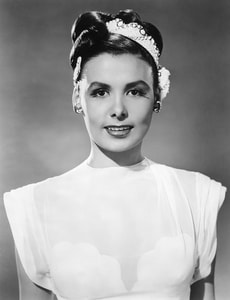
Horne advocated for human rights and took part in the March on Washington in August 1963. Later she returned to her roots as a nightclub performer and continued to work on television, while releasing well-received record albums. She announced her retirement in March 1980, but the next year starred in a one-woman show, Lena Horne: The Lady and Her Music, which ran for more than 300 performances on Broadway. She then toured the country in the show, earning numerous awards and accolades. Horne continued recording and performing sporadically into the 1990s, retreating from the public eye in 2000. Horne died of congestive heart failure on May 9, 2010, at the age of 92.
Horne was long involved with the Civil Rights Movement. In 1941, she sang at Café Society, New York City's first integrated venue, and worked with Paul Robeson. During World War II, when entertaining the troops for the USO, she refused to perform "for segregated audiences or for groups in which German POWs were seated in front of black servicemen", according to her Kennedy Center biography. Because the U.S. Army refused to allow integrated audiences, she staged her show for a mixed audience of black U.S. soldiers and white German POWs. Seeing the black soldiers had been forced to sit in the back seats, she walked off the stage to the first row where the black troops were seated and performed with the Germans behind her. However, the USO observed at the time of her death that Horne did in fact tour "extensively with the USO during WWII on the West Coast and in the South." The organization also commemorated her for the appearances she made on Armed Forces Radio Service programs Jubilee, G.I. Journal, and Command Performances. In the film Stormy Weather (1943), Horne's character would perform the film's title song as part of a big, all-star show for World War II soldiers as well. After quitting the USO in 1945, Horne financed tours of military camps herself.
She was at an NAACP rally with Medgar Evers in Jackson, Mississippi, the weekend before Evers was assassinated. She was at the March on Washington and spoke and performed on behalf of the NAACP, SNCC, and the National Council of Negro Women. She also worked with Eleanor Roosevelt in attempts to pass anti-lynching laws. Tom Lehrer mentions her in his song "National Brotherhood Week" in the line "Lena Horne and Sheriff Clark are dancing cheek to cheek" referring (wryly) to her and to Sheriff Jim Clark, of Selma, Alabama, who was responsible for a violent attack on civil rights marchers in 1965. In 1983, the NAACP awarded her the Spingarn Medal.
Horne was a registered Democrat and on November 20, 1963, she, along with Democratic National Committee (DNC) Chairman John Bailey, Carol Lawrence, Richard Adler, Sidney Salomon, Vice-Chairwoman of the DNC Margaret B. Price, and Secretary of the DNC Dorothy Vredenburgh Bush, visited John F. Kennedy at The White House, two days prior to his assassination.
 RSS Feed
RSS Feed